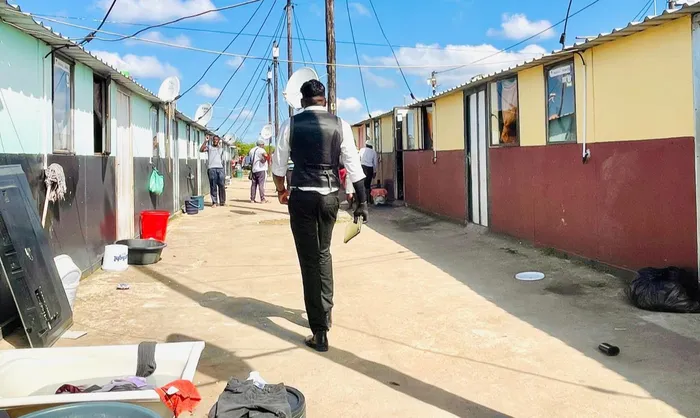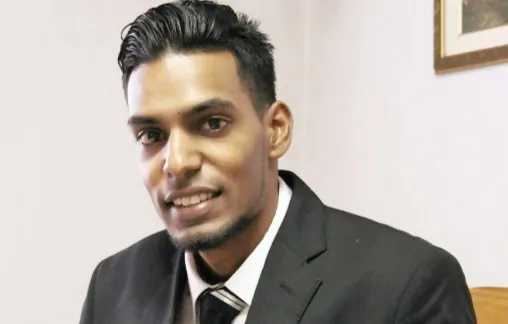
Previn Vedan at the Crossmoor Transit Camp
Image: Supplied
I COME to you not from behind a desk, but from the front lines of lived experience.
In 2022, violence shattered the rhythm of my life, leaving me physically wounded - and yet strangely more awake than I had ever been. I learned what it means to rebuild not just a body, but a spirit. And in that painful rebuilding, I rediscovered my purpose - to fight for those whose struggles are too often left unseen.
I have walked these streets. I have argued in our courts. I have buried the victims of neglect. I never abandoned the struggle - I simply needed time to find the right words.
Now, I have written them.
For millions of South Africans, home is more than brick and mortar. It is the foundation of safety, identity, and dignity. It is the place where a child first learns to dream and a mother finally exhales after a long day. It is the right enshrined in our Constitution: “Everyone has the right to have access to adequate housing.”
Yet in the daily life of our nation, that right remains a promise deferred.
Growing up in Shallcross, Durban - and now adjusting to life with a disability - I have seen how “home” can be both sanctuary and battlefield. When you rely on grants set far below the poverty line, and you face the silent stigma of disability inside your own four walls, your home becomes more than shelter — it becomes your last line of dignity against a world too quick to turn away.
And when even that is taken from you, you are not just homeless. You are unseen.
Across our cities - in Durban, in Johannesburg, in Cape Town - tens of thousands sleep rough each night. Their bodies are exposed to cold rains, their souls battered by the indifference of passers-by. Their suffering is not random. It is stitched together with poverty, with disability, with untreated trauma.
Surveys in the Covid-19 era showed us the stark truth, over half of homeless shelter residents suffered anxiety; a third battled severe psychiatric symptoms.
Homelessness wounds not only the body, but the mind.
When society tells a man he is worthless, the soul sometimes listens.
I have witnessed it first-hand - the coughing man turned away from a police station, left to die on the curb because no one wanted to see him. His death was not a tragedy of fate; it was a failure of our shared humanity.
Disability deepens the peril.
In South Africa’s frayed safety nets, the disabled are already among the poorest of the poor. When housing collapses, there is no second layer of protection. I live with this awareness every day — without my adapted shelter, a gust of misfortune could push me into the void too.
It is a fear many carry in silence.
But amid the hardship, I have also seen small miracles.
At the Denis Hurley Centre in Durban, the homeless are not pitied - they are respected. A warm shower, a clean shirt, a place to sit without shame: these are not luxuries. They are acts of radical affirmation. They whisper to a person, “You still matter.”
And it matters that we listen.
When 200 homeless individuals gathered in 2024 to tell their stories - not as statistics, but as voices - they spoke not of handouts, but of dignity.
“We are invisible,” one man said.
“We are not criminals,” said another.
Their demand was simple: See us. Hear us. Let us live with honor.
It should not be radical to say that dignity must be the foundation of any society that calls itself free.
Archbishop Desmond Tutu warned us: We are all wounded, victim and perpetrator alike, and we will only heal together. Yet how can we speak of healing when mothers lie under wet blankets, when students sleep in libraries, when fathers die coughing blood on sidewalks?
The social contract - that sacred promise between citizen and state - is fraying.
Housing delivery has made strides, yes. Since 1994, millions of homes have been built. KwaZulu-Natal became a national leader in providing housing opportunities. But at the current rate, it would take decades just to clear the existing backlog. In eThekwini, in my own ward, projects like the Shallcross Flats upgrades show what is possible when government and community walk side by side.
We celebrated families finally receiving title deeds, claiming ownership after decades of uncertainty.
But every victory reminds us how long justice was denied. And while we build, history still haunts us.
In 2021, South Africa erupted into violence that many tried to explain away as simple criminality. But deeper currents pulled at those riots: poverty, anger, racial mistrust - old scars reopened.
We saw first-hand that our rainbow nation remains fragile. We must not allow our cities to retreat into fear and separation. If we are serious about building a future, we must build integrated communities, where dignity crosses the lines of colour and class.
The truth is hard, apartheid’s spatial legacy still lives on.
Our mass housing projects too often push the poor to the periphery, repeating old patterns of exclusion. We say “inclusion” but our cities are still ringed by poverty.
And globally, we are not alone.
In India, slums are hidden behind green tarps during summits. In America, affordable housing is rationed like charity. Wherever housing becomes a market good instead of a human right, the vulnerable are left outside.
South Africa’s Constitution gives us the rare gift of a true right to housing. The Grootboom Case taught us that the state must act reasonably and urgently for those in desperate need. But rights on paper mean little without political will and the courage to call injustice by its name.
Corruption, mismanagement, and the shadow economy of “shack lords” have turned suffering into profit. Bureaucracy has calcified. In eThekwini and elsewhere, waiting lists have become fiction, and deserving families wait for homes that never come.
Still, in moments of disaster, we glimpse what solidarity looks like.
After the floods that destroyed Bottlebrush in 2019, I watched as a community built itself anew — Indian, Black, White, working side by side, refusing to let disaster divide them.
The Crossmoor Transit Camp stands not just as a site of survival, but of human decency in action.
We must design our future with intention.
A house must be more than walls, it must be part of a community, with parks, clinics, playgrounds. A neighborhood must feed the body and the spirit. As I learned growing up in Durban’s Shallcross township, a soccer field can be as essential as a school.
Inequality today cuts across race and class. A growing Black middle class lives alongside struggling white pensioners and Indian shopkeepers.
If we are to rebuild the country our Constitution promised, we must recognise poverty in all its faces — and refuse to let it be invisible.
We must build cities where inclusion is the rule, not the exception. Where a child’s address does not determine their destiny. Where the dignity of shelter is a birthright, not a lottery prize.
The work ahead is difficult.
It will take more than speeches. It will take leaders who are willing to listen, to labor, and - when necessary - to fight. But I believe it can be done.
Because I have seen it - in the resilience of shack dwellers, in the hope of Crossmoor, in the courage of the residents of the Shallcross Flats refusing to be silenced.
The task is hard. The alternative is unthinkable. Dignity cannot wait. And neither will we.

Previn Vedan
Image: Supplied
Previn Vedan is a lawyer and human rights advocate
** The views expressed do not necessarily reflect the views of IOL or Independent Media.
Related Topics: